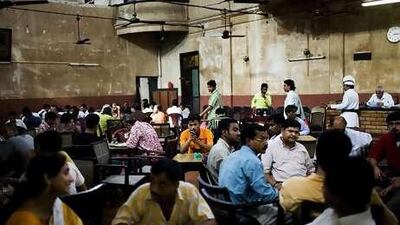KOLKATA // When he first walked through the doors of the India Coffee House in the early 1970s, Raja Chatterji did not know a soul in Kolkata. Decades and a few hundred cups of coffee later, he can introduce a dozen friends with a sweep of his hand. "This is the famous poet, Chandan Ghosh; this is the writer, Angshuk Bhowmik ? And this is a terrorist," he said, gesturing to his white-bearded neighbour, who nodded back with a smile that suggested he did not understand English.
"He used to make bombs and throw them at police. Now, he has retired from the revolution." Little has changed since the heady 1970s when student protesters, philosophers and not-yet-famous filmmakers holed up in Kolkata's first coffee house. Beneath a fleet of wobbly ceiling fans, hundreds of regulars still hunch over faded tables, where conversation is couched in cigarette smoke - and coffee is beside the point.
"Sometimes, I would sit for six to eight hours without any coffee," recalled Mr Chatterji, 62. "That was the privilege we had." The grey-haired filmmaker retains that privilege today, often sitting from morning until night, holding court at a corner table with old comrades. "If you want to know how people are feeling, come to the coffee house," he said. Except, these days, the conversation is no longer aimed only at the government - real estate developers are a frequent topic
Kolkata appears unaffected by the country's spiralling inflation, boasting a buoyant real estate market even as other major Indian cities falter. Over the past four months, real estate value has climbed by seven per cent to 10 per cent. Keen to capitalise on the city's growth, developers are filling the skyline with high-rises, hotels and megamalls like the recently completed Mani Square plaza. With a plumb location near the University of Calcutta, the India Coffee House seems to be a prime candidate for the wrecking ball.
"They are chasing us," Mr Chatterji said. "They are already bringing down a lot of buildings." But the Indian Coffee Workers' Co-operative, the 70-member board that runs the establishment, said there were no plans to sell a slice of the city's history. "Many people still come here to discuss matters," said Subhosh Ganguly, an accountant with the co-operative. "There are doctors, politicians and lawyers."
Instead, the board wants to make some changes, much to the chagrin of the cafe's clientele. "When you go into a Starbucks, you pay for your coffee, you sip it and then you walk away," Angshuk Bhowmik, a 22-year old writer, said. "This is a place where people sit and converse. "If it is at all commercialised, the ambience will be lost, and that would be sinister." Originally called Albert Hall when it was built in 1896, the building was taken over by the co-operative in 1942 as an attempt to introduce coffee to the Indian palate. It quickly established itself as the place to debate everything from philosophy to art, the role of government and the public sphere.
Subhas Chandra Bose, a West Bengal hero who fought the British Raj, frequently passed the time here, as did Satyajit Ray, the filmmaker. The coffee house is still regarded as a safe haven for some of the city's more radical elements, and waiters have even been known to help customers out the back door when police appear at the front. It is also a gossip pit, a study hall for students from a nearby school and a mobile office for India's road warriors.
Mr Bhowmik, who has lived in Kolkata all his life, is hopeful that his "second home" will not undergo any radical changes. "They will put new colour here," he said of the proposed renovations. "Maybe new management will come in." The place has certainly seen better days. In the early 20th century, when Kolkata was called Calcutta and served as the capital of the Raj, the Albert Hall boasted an illustrious clientele. Politicians and nobility from across the country were frequent visitors, luxuriating beneath gaping, sun-drenched windows and attended to by an army of uniformed waiters.
Today, white-clad waiters still roam the floor, bearing trays of water, or delivering mutton, egg and chicken dishes from a paltry menu posted on the wall, which rarely changes. But the windows are shuttered, walls are peeling, and the floor needs more than a mere sweep. "It's shabby," Mr Chatterji said, not disguising his grumbling. "We need some changes. "I'm not against change, but this coffee house has had enough of revolutions," he said.
@Email:ccotroneo@thenational.ae

